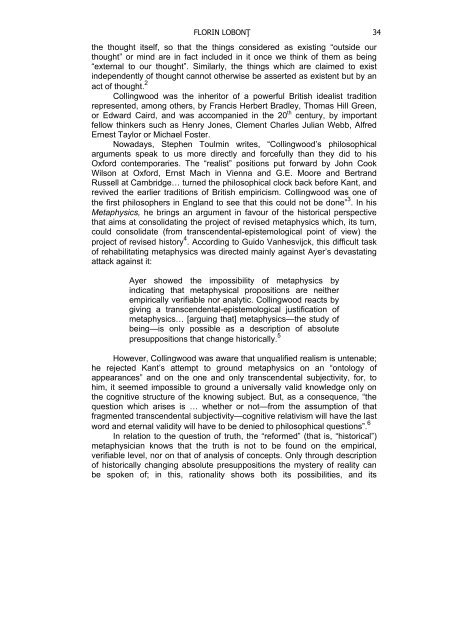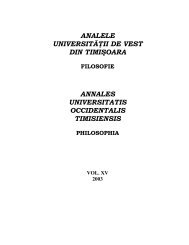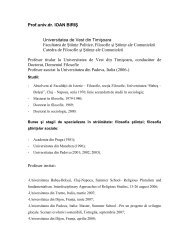VOL. IV (XXI) 2009 - Departamentul de Filosofie si Stiinte ale ...
VOL. IV (XXI) 2009 - Departamentul de Filosofie si Stiinte ale ...
VOL. IV (XXI) 2009 - Departamentul de Filosofie si Stiinte ale ...
Create successful ePaper yourself
Turn your PDF publications into a flip-book with our unique Google optimized e-Paper software.
FLORIN LOBONŢ 34<br />
the thought itself, so that the things con<strong>si</strong><strong>de</strong>red as existing “out<strong>si</strong><strong>de</strong> our<br />
thought” or mind are in fact inclu<strong>de</strong>d in it once we think of them as being<br />
“external to our thought”. Similarly, the things which are claimed to exist<br />
in<strong>de</strong>pen<strong>de</strong>ntly of thought cannot otherwise be asserted as existent but by an<br />
act of thought. 2<br />
Collingwood was the inheritor of a powerful British i<strong>de</strong>alist tradition<br />
represented, among others, by Francis Herbert Bradley, Thomas Hill Green,<br />
or Edward Caird, and was accompanied in the 20 th century, by important<br />
fellow thinkers such as Henry Jones, Clement Charles Julian Webb, Alfred<br />
Ernest Taylor or Michael Foster.<br />
Nowadays, Stephen Toulmin writes, “Collingwood’s philosophical<br />
arguments speak to us more directly and forcefully than they did to his<br />
Oxford contemporaries. The “realist” po<strong>si</strong>tions put forward by John Cook<br />
Wilson at Oxford, Ernst Mach in Vienna and G.E. Moore and Bertrand<br />
Russell at Cambridge… turned the philosophical clock back before Kant, and<br />
revived the earlier traditions of British empiricism. Collingwood was one of<br />
the first philosophers in England to see that this could not be done” 3 . In his<br />
Metaphy<strong>si</strong>cs, he brings an argument in favour of the historical perspective<br />
that aims at consolidating the project of revised metaphy<strong>si</strong>cs which, its turn,<br />
could consolidate (from transcen<strong>de</strong>ntal-epistemological point of view) the<br />
project of revised history 4 . According to Guido Vanhesvijck, this difficult task<br />
of rehabilitating metaphy<strong>si</strong>cs was directed mainly against Ayer’s <strong>de</strong>vastating<br />
attack against it:<br />
Ayer showed the impos<strong>si</strong>bility of metaphy<strong>si</strong>cs by<br />
indicating that metaphy<strong>si</strong>cal propo<strong>si</strong>tions are neither<br />
empirically verifiable nor analytic. Collingwood reacts by<br />
giving a transcen<strong>de</strong>ntal-epistemological justification of<br />
metaphy<strong>si</strong>cs… [arguing that] metaphy<strong>si</strong>cs—the study of<br />
being—is only pos<strong>si</strong>ble as a <strong>de</strong>scription of absolute<br />
presuppo<strong>si</strong>tions that change historically. 5<br />
However, Collingwood was aware that unqualified realism is untenable;<br />
he rejected Kant’s attempt to ground metaphy<strong>si</strong>cs on an “ontology of<br />
appearances” and on the one and only transcen<strong>de</strong>ntal subjectivity, for, to<br />
him, it seemed impos<strong>si</strong>ble to ground a universally valid knowledge only on<br />
the cognitive structure of the knowing subject. But, as a consequence, “the<br />
question which arises is … whether or not—from the assumption of that<br />
fragmented transcen<strong>de</strong>ntal subjectivity—cognitive relativism will have the last<br />
word and eternal validity will have to be <strong>de</strong>nied to philosophical questions”. 6<br />
In relation to the question of truth, the “reformed” (that is, “historical”)<br />
metaphy<strong>si</strong>cian knows that the truth is not to be found on the empirical,<br />
verifiable level, nor on that of analy<strong>si</strong>s of concepts. Only through <strong>de</strong>scription<br />
of historically changing absolute presuppo<strong>si</strong>tions the mystery of reality can<br />
be spoken of; in this, rationality shows both its pos<strong>si</strong>bilities, and its




